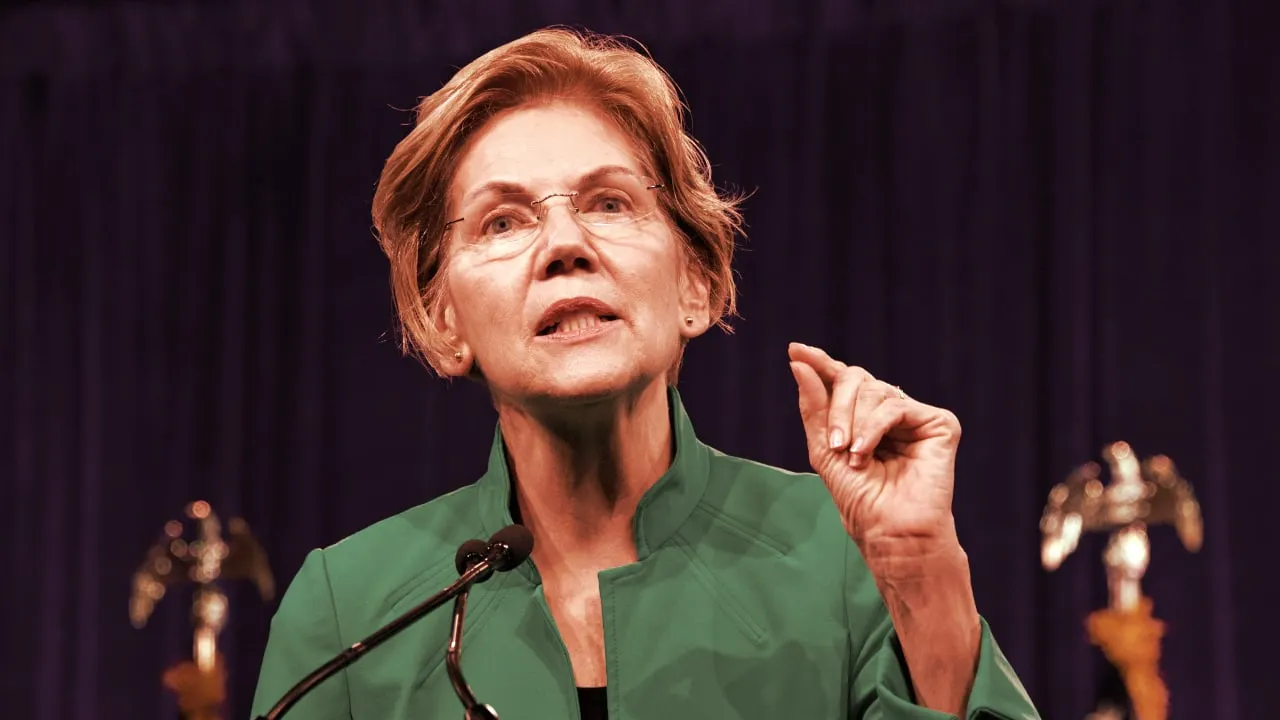In brief
- U.S. Senators Warren and Marshall today proposed the Digital Asset Anti-Money Laundering Act, targeting the cryptocurrency industry.
- The bill, which would place new KYC requirements on crypto network participants, has been deemed “opportunistic” and “unconstitutional” by advocacy group Coin Center.
Amid this week’s United States Senate hearings about the collapse of FTX, Senators Elizabeth Warren and Roger Marshall today introduced the Digital Asset Anti-Money Laundering Act, which targets the cryptocurrency industry with a number of proposed regulations that critics are calling authoritarian and unconstitutional.
The proposed bill seeks to place know-your-customer (KYC) requirements on blockchain infrastructure providers and participants operating in the United States, including developers creating software for decentralized networks and even the miners and validators that support such networks.
Warren and Marshall’s bill would direct the Financial Crimes Enforcement Network (FinCEN) to treat crypto wallet service providers, miners, validators, and other network users as “money service businesses,” per Warren’s statement, and thus require KYC for participants along with a requirement for anti-money laundering (AML) programs.
The bill would also impact unhosted, or self-custody crypto wallets, requiring platforms and networks to identify such customers and track their transactions. FinCEN proposed such a rule in December 2020, which many crypto industry companies and advocates spoke out against, but it has yet to be implemented. The bill seeks to finalize that process.
Furthermore, the bill prohibits any financial institution from using a digital asset mixer service or other privacy-enhancing technologies. Mixers are typically used to conceal transactions of cryptocurrency between wallets. The best-known Ethereum mixer service, Tornado Cash, was banned by the U.S. Treasury via sanctions in August.
“The crypto industry should follow common-sense rules like banks, brokers, and Western Union, and this legislation would ensure the same standards apply across similar financial transactions,” said Warren in a statement. “The bipartisan bill will help close crypto money laundering loopholes and strengthen enforcement to better safeguard U.S. national security.”
Already, the proposed bill has drawn significant scrutiny from the crypto industry. In a post this morning, crypto advocacy group Coin Center decried the bill as “an opportunistic, unconstitutional assault on cryptocurrency self custody, developers, and node operators.”
Senators Warren and Marshall's proposed bill subjecting software devs & nodes to AML is "a repudiation of liberal values and a move towards the types of surveillance and control prized by authoritarians like Vladimir Putin, Xi Jinping, and Kim Jong-un"https://t.co/s7pRKsWV2W
— Peter Van Valkenburgh 🌐🌮 (@valkenburgh) December 14, 2022
“The Digital Asset Anti-Money Laundering Act is a direct attack on technological progress and also a direct attack on our personal privacy and autonomy,” wrote Coin Center Director of Research, Peter Van Valkenburgh.
“Make no mistake, while proposed as a solution to potential money laundering and terrorist financing, the bill is in fact a repudiation of liberal values and a move towards the types of surveillance and control prized by authoritarians like Vladimir Putin, Xi Jinping, and Kim Jong-un,” he added.
The bill was introduced following November’s collapse of cryptocurrency exchange FTX, with founder and former CEO Sam Bankman-Fried arrested this week by Bahamian police amid numerous criminal charges from U.S. authorities.
Bankman-Fried faces charges from the U.S. Securities and Exchange Commission (SEC) and Commodity Futures Trading Commission (CFTC), as well as the Complex Frauds and Cybercrime Unit at the Southern District of New York U.S. Attorney’s Office. Coin Center alleges that the bill would not prevent another FTX-like collapse in the future.
“This bill is focused exclusively on financial surveillance and does not address any of the issues of corporate control that led to the collapse of FTX,” Van Valkenburgh wrote.
The proposed bill has drawn similar scrutiny as last year’s infrastructure bill, which changed the Internal Revenue Service’s definition of a “broker” to include companies that trade crypto assets, forcing exchanges to report transactions to the government. That bill was feared to also impact network participants like validators and miners, plus crypto wallet providers and more.
Regulation focused on unhosted wallets has also gained traction in Europe this year, with the European Union voting to impose KYC on such wallets in March, and the United Kingdom considering similar legislation this summer before ultimately scrapping its plans.

